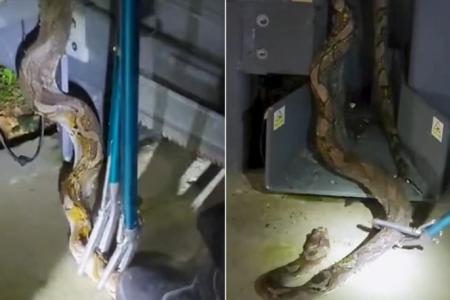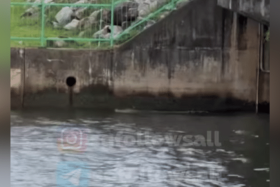Reticulated python burned alive, NParks investigating
A reticulated python was reportedly burned alive on Nov 20, and the National Parks Board (NParks) is looking into the case.
In a video posted online on Nov 26 by the Animal Concerns Research and Education Society (Acres), two people can be seen burning the snake using flammable spray cans. One of them also steps on the writhing animal.
The snake is then disposed of in a clear container.
Acres said this was one of the worst cases of animal cruelty it had encountered.
It is an offence under the Wildlife Act to kill, trap or take any wildlife without the approval of the director-general of NParks.
Offenders can be fined up to $50,000, jailed for up to two years, or both if the offence is committed in relation to protected wildlife.
The reticulated python (Malayopython reticulatus) is protected under Appendix II of the Convention on International Trade in Endangered Species of Wild Fauna and Flora (Cites).
Acres co-chief executive Anbarasi Boopal said the snake, which from the video appeared to be stuck in machinery, was burned for several seconds three times.
She pointed out that the snake, estimated to be about 2m long, was not posing any danger to anyone.
She told The Straits Times that this incident was the worst she had seen, and called it “shocking” and “deeply frustrating”.
“This keeps happening to our snakes and monitor lizards... Some of us may view animals differently and may favour certain species over others but suffering and pain are universal,” said Ms Anbarasi, adding that the snake is unlikely to survive the stress and injuries.
NParks group director for enforcement and investigation Jessica Kwok told ST that NParks has received feedback on a case of alleged animal cruelty involving a reticulated python being burned alive, and is looking into the matter.
“NParks takes all cases related to animal cruelty seriously and investigates all feedback received,” she said. “We will take action against anyone who has committed an act of animal cruelty.”
Snakes are often the target of animal cruelty.
Acres said it has received reports of snakes being sprayed with insecticides, stepped on, or attacked with fire, hot water or sticks.
The organisation recorded 85 cases of cruelty to reptiles, mostly snakes, in the past decade.
Separately, it has also investigated 55 cases of animal cruelty or mishandling of reptiles by members of the public and pest control companies since 2015. Of the 55, 23 were reported to NParks, said Ms Anbarasi.
Citing an April 2023 case where a man killed a python with a cleaver in Boon Lay and was fined $1,000, Ms Anbarasi said decisive action and increased awareness are needed to reinforce that Singapore does not tolerate cruelty towards any animal.
Reticulated pythons are non-venomous and usually found in forested areas, but the occasional foray into drains, canals and sometimes homes is not unusual.
Mr Kamalakannan Raja, president of reptile and amphibian enthusiast group Herpetological Society of Singapore (HSS), said snakes like pythons are native fauna and should be treated with as much respect as other animals here like otters and pangolins.
“This is a clear case of animal cruelty, and we condemn it in the strongest possible terms. There is no reason to resort to such unusual handling and removal methods, and we hope the individuals involved are entirely held accountable,” he said.
Members of the public are advised to call NParks’ 24-hour Animal Response Centre if they need assistance on wildlife like snakes. Animal management companies certified to handle reptiles can also handle snakes.
NParks group director for wildlife management How Choon Beng said NParks has implemented an Animal Management Professional Certification Programme to train professionals in the animal management industry to ensure public safety, personnel safety and animal welfare.
The programme includes basic and intermediate courses. To handle reptiles like snakes, animal management companies have to complete the basic course and an intermediate course on handling reptiles.
Ms Sara-Ann Lee, clinical psychologist at private clinic The Psychology Practice, said the negative portrayal of snakes may have resulted in humans seeing them as a threat.
“As a result, individuals may feel fear and disgust when they see a snake. This may cause them to harm the snake in fear that the snake will attack them first,” she said.
Ms Diana Santoso, counselling psychologist at private clinic Annabelle Psychology, said people may fear snakes due to an evolutionary advantage – people who avoided snakes tended to have a higher likelihood of survival.
She pointed out that while certain individuals who harm snakes may do so due to underlying aggression or lack of empathy, most people act out of fear or ignorance.
Mr Kamalakannan said: “In Singapore, we often live close to nature, with people visiting nature areas for exercise and enjoyment or animals venturing out while foraging or dispersing to new places.”
Many animals can get defensive when cornered or stressed and can injure people if they feel threatened, he added.
“When encountering animals in such instances, it is crucial to keep a safe distance before taking photographs or observing them, especially if they are in a natural area.”
Ms Anbarasi added: “Fear and ignorance are often cited as reasons for mistreatment, but they do not justify cruelty.”
Members of the public are advised to stay calm and back away slowly when they see snakes. For assistance, call NParks’ 24-hour Animal Response Centre on 1800-476-1600.
People are encouraged to report suspected cases of animal cruelty to NParks or provide potential evidence via its website at https://www.nparks.gov.sg/feedback-and-enquiry.
More information on snakes can be found on the Our Wild Neighbours website.
Get The New Paper on your phone with the free TNP app. Download from the Apple App Store or Google Play Store now


